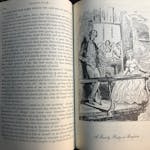John Jay Osborn, known for his 1971 novel "The Paper Chase" (among others), mines the world of marriage counseling in his latest work, "Listen to the Marriage." Sandy Hyland, a blunt therapist, conducts sessions with Stephen, a newly minted partner at his firm, and Gretchen, a tenured professor. The couple's troubles are somewhat predictable: stress at work, extramarital dalliances.
Osborn adds texture with frequent access to Sandy's thoughts, including her impatience with Stephen and Gretchen. "These two are good little wonks, you give them an assignment, they can't help themselves, they want to do a good job," she muses at one point. Her therapeutic plans include setting up Stephen and Gretchen for inevitable arguments.
There are risks in the novel's structure, which relies on stasis and repetition, as Gretchen and Stephen circle the same questions: Do they share a goal of reconciliation, or, as Gretchen asserts, are they learning how to get divorced? "Sandy is teaching us not to kill each other in the divorce process," she says.
Sandy is far from a peacekeeper — when Stephen asks her what chance he has of reuniting with his wife, she answers, "One in a thousand" — but she never claims to be all-knowing.
Although Sandy is largely focused on her clients, thoughts about her mother, "legendary real estate maven" Heidi Hyland, surface occasionally. It's clear that Sandy's relationship to her mother is complex — the building in which she conducts her counseling sessions is, as a plaque outside proclaims, "A GIFT FROM HEIDI HYLAND TO HER LOVING DAUGHTER SANDY, WHO THANKS HER FOR HER GENEROSITY."
Every time the novel approaches the subject of Heidi too closely, it snaps its attention back to Gretchen and Stephen; one suspects that Sandy is unable to examine her own life with the ruthless clarity she applies to others.
Such a straightforward examination begets clean, straightforward prose, although occasionally Osborn wanders into lyrical territory: Stephen "looked about the same: downcast, depressed, a cracked translucent china plate, like the ones Sandy's mom had bought late in life, porcelain so thin you could see your hand through it." Gretchen's earrings are "large and beautiful stones, hiding in the straw of her long blond hair." Sandy's gaze rarely stays on appearances for long; she seeks truth, uncomfortable as it often is.
Through the marriage counselor, Osborn gives his readers a kind of directive: "Usually, Sandy didn't pay much attention to the world beyond her small office. … The important story was what happened inside her office. It was what she had to focus on, it was the story, it was what was really happening." Similarly, the novel takes place almost entirely in the confines of the office, in the challenging, edifying conversations Stephen and Gretchen endure.
Jackie Thomas-Kennedy's writing has appeared in Lenny Letter, Narrative, Crazyhorse, the Millions, Harvard Review and elsewhere. She held a 2014-16 Stegner Fellowship at Stanford University.
Listen to the Marriage
By: John Jay Osborn.
Publisher: Farrar, Straus & Giroux, 246 pages, $25.






